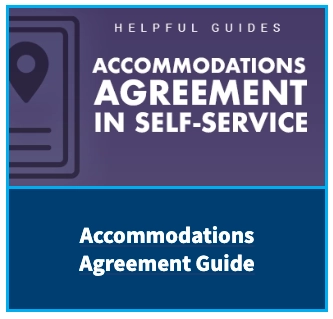One of the accommodations that a student with a disability may use is flexible attendance, where the student may be allowed to exceed the attendance policy of an instructor or department.
Student Accommodation Services does not have a role in determining course attendance policies. Because attendance may be integral to the learning outcomes of a course, these policies are set by instructors or by the departments. Similarly, instructors also determine policies regarding make-up work and missed quizzes and exams.
In some cases, attendance is fundamental to course objectives; for example, students may be required to interact with others in the course, to demonstrate the ability to think and argue critically, or to participate in group projects. In other instances, instructors may determine that students can master course content despite some or many absences. Rarely, instructors may decide that students do not need to attend course sessions at all.
The ADA does not require instructors to lower academic standards or substantially modify course expectations. However, some students are eligible for a flexible attendance accommodation, because of their health. Generally, this means a student will not lose points for missing a course session. Instructors may choose to be consistent with enforcement of their policies; however, each request should be evaluated individually. Instructors should make their policies clear so that students can make informed choices about which courses to take.
Instructors should pay attention to possible claims of differential treatment. Occasionally, an instructor has a strict attendance policy on paper but has modified it for others. It is important to consider any exceptions you may have made; either to your own policy or that of the program, especially for nondisabled students (i.e. death in the family, flu outbreak, sick child etc.)
Each attendance flexibility request must be considered on a case by case basis. However, flexible attendance accommodations require an interactive discussion between you and the student in order to reach an understanding about how attendance impacts the student’s ability to meet the objectives/requirements of the course, and what flexibility can be provided. Prior to that discussion, please consider the following questions in making that determination. These questions were obtained from a Letter of Finding from the Office for Civil Rights to Cabrillo Community College in California [Case No. 09-96-2150; OCR Region IX, 1996]).
- Is there regular classroom interaction between the instructor and the students and among the students themselves?
- Do student contributions in the classroom constitute a significant component of the learning process?
- Does the fundamental nature of the course rely upon student participation as an essential method of learning?
- To what degree does the student’s failure to attend constitute a significant loss of the educational experience of the other students in the course?
- What do the course description and syllabus say regarding attendance?
- What is the method by which the final grade is calculated?
After reviewing the essential questions, a reasoned judgment should be made about whether a waiver of this course attendance requirement would be acceptable and warrant flexible attendance accommodation. While in some cases attendance is essential in meeting course objectives/requirements, in other instances, instructors may determine that students can master course content despite absences. In providing this accommodation, instructors are not required to modify course content.
Absences which are not disability related are not covered under flexible attendance, and should be treated as you would a similar absence for any other student in your course.
- Routine medical appointments, transportation difficulties, work-related activities, etc., are not reasons to warrant the disability related flexible attendance accommodation because they are not disability related.
- Accommodations are NOT retroactive.
- Students with a flexible attendance accommodation are not required to disclose the nature of the absence, only that it is disability related, nor are they required to provide you with any documentation of the absence.
- Regardless of determination, the deliberative process should be well documented, so that others who were not involved in the process can understand the considerations taken into account and the reason for final determination. The Student Accommodation Services team strongly recommends that there be written documentation of the agreement between the instructor and the student regarding when any work from a disability related absence must be completed/submitted.
- One option might be a communication via email, with a request that the student confirm receipt of the email.
- Another possibility might be a document signed by the instructor and the student.
- We strongly suggest that you forward a copy of any agreement(s) to Mid Michigan College’s Student Accommodation Services, who will provide support to you and the student throughout the semester.
